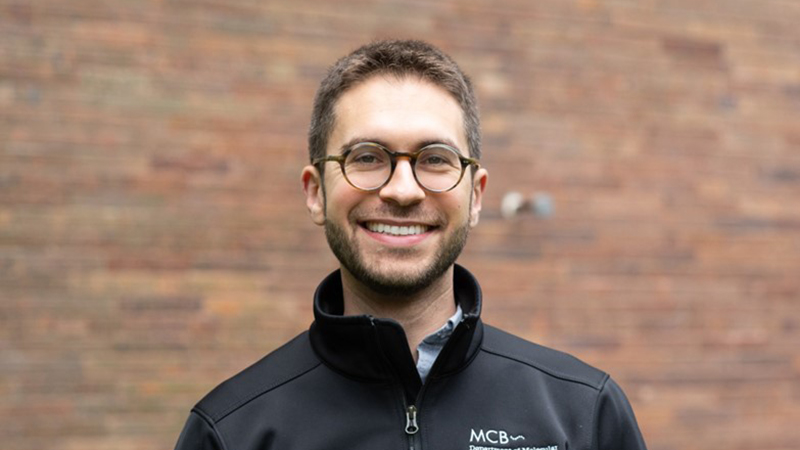I’m interested in how very young animals, such as infants, experience the world and behave in it. We tend to think of infants as passive or undeveloped because they can’t do fancy things that adults do, like have an intellectual conversation. Yet infants have very particular ways of engaging with the world that are important for their survival and growth, and that are different from adults. I explore the infant-specific brain mechanisms that underlie these behaviors, using mouse models and combining tools from molecular and systems neuroscience. In the future, I plan to extend this work and look even earlier in development, at prenatal behaviors.
Photo by Celia Muto
What are the big questions driving your research?
I’ve always been interested in understanding why animals do what they do. What’s happening in the brain that drives a certain behavior and not others? What are the actual dynamics, and in which brain areas and neurons do they take place?
I’m most interested in the behavior of young animals such as infants, because it’s extremely understudied and unusual. For example, newborn humans and mice sleep ~80% of the time – in fact, prominent sleep early in development is conserved among nearly all animals. Why is this? We have some theories, but nothing very convincing. The mystery of sleep has always fascinated me, and I hope that exploring it from this developmental angle can provide new insight.
Young animals also have very particular social relationships, especially with parents. My recent work focused on the development of the hypothalamus, a brain region that regulates homeostatic needs such as sleep, as well as social behaviors. Such subcortical brain regions are molecularly super diverse, and important for all kinds of diverse behaviors as well. Yet, they haven’t been studied much in younger animals, where there may be some important differences in how they function.
Looking forward, I’m becoming increasingly fascinated by prenatal behavior. The womb is an environment unlike any other, and for most mammals, that is where behavior truly begins. However, we have no experimental setups to study behavior during this important period in life. I’m hoping to change that in the coming years.
What drew you to this area of neuroscience?
I’ve always been drawn to the most mysterious, understudied topics. This brought me to the questions discussed above, about sleep, infancy, and prenatal behavior. I’m especially interested in such topics if there are new powerful tools we can use, that have not yet been applied in these areas.
Additionally, while living in Vienna, Austria during my PhD, I had an experience that inspired my current research direction. As an American in Vienna, I became friendly with a group of other ex-pats from English speaking countries, many of them classical musicians. As I got to know them, I learned that in most cases, professional musicians begin playing their instruments extremely young, usually around 3 years old. I was fascinated with the idea that such a young person can have such an interesting behavior, to develop a relationship with music and a technical ability that lasts a lifetime. I realized that we know so little about how the brain drives behavior at these young ages, and that led to my current focus.
What is the first experiment you remember doing?
My very first experiment was high-risk, high-reward. As an undergraduate student at NYU, I was trying to develop a genetic tool to silence the expression of any gene of interest in Drosophila. This led to endless troubleshooting and ultimately failed, but I learned so much. Namely, that I actually enjoy even the tedious parts of doing research, and that failure is an expected and normal part of the process, especially with riskier projects. I also learned about good lab management, as my PI got me going with other experiments that did work and ultimately contributed to a publication.
What are your hopes for the future?
I aim to run an independent research lab focused on how the brain controls behavior at early developmental stages. My dream is that this research direction will provide truly novel insight into fundamental neuroscience questions. I hope to create a lab that is vibrant, welcoming, and inspiring environment for scientists from diverse backgrounds and perspectives, and that we’ll have a lot of fun and unexpected twists and turns along the way.

